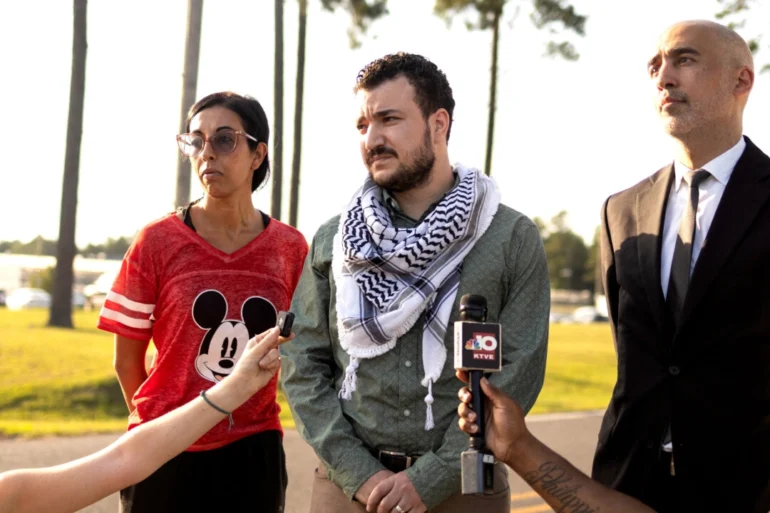On June 20, 2025, Mahmoud Khalil, a former Columbia University graduate student and prominent pro-Palestinian activist, walked free from an Immigration and Customs Enforcement (ICE) detention center in Jena, Louisiana, after over three months in custody. His release, ordered by U.S. District Judge Michael Farbiarz in New Jersey, marks a significant victory for Khalil and his supporters, who argue his detention was an attempt to silence dissent against Israel’s military actions in Gaza. The case has sparked heated debate about free speech, immigration policy, and the Trump administration’s crackdown on campus activism.
A High-Profile Arrest
Khalil, a 30-year-old green card holder married to a U.S. citizen, was arrested in New York City in March 2025 under an executive order issued by President Donald Trump. The order targeted individuals accused of engaging in anti-Semitic or pro-terrorist activities on college campuses, following the pro-Palestinian protests that swept universities like Columbia in spring 2024. Khalil, a key spokesperson for student protesters opposing Israel’s military campaign in Gaza after Hamas’s October 7, 2023, terrorist attack, became a focal point of the administration’s enforcement efforts.
“They chose the wrong person for this,” Khalil declared upon his release, emphasizing that no one should face detention for protesting what he calls a “genocide” in Gaza. His arrest led to the cancellation of his green card and an attempt to deport him, actions his lawyers argued violated his constitutional rights. Transferred to a detention facility in Louisiana, far from his family in New York, Khalil’s case quickly became a symbol of the broader struggle for free expression.
The Legal Battle
The legal fight for Khalil’s freedom unfolded in a series of courtroom clashes. On June 11, Judge Farbiarz blocked Khalil’s continued detention, citing constitutional concerns. However, the Trump administration persisted, arguing that Khalil’s detention was justified by a separate charge of fraud in his permanent residency application and that he should pursue relief through standard immigration processes. Government attorneys, led by Dhruman Sampat, claimed the executive branch held broad authority to detain and deport individuals deemed a threat, invoking a Cold War-era provision of the Immigration and Nationality Act of 1952.
Khalil’s legal team, including attorney Alina Das from NYU’s Immigrant Rights Clinic, countered that his detention was unlawful and that he posed no flight risk or public danger. They highlighted his role as a primary caregiver to his infant son, born during his detention, and argued that his arrest was a clear attempt to suppress his activism. On June 20, Farbiarz granted Khalil bail, rejecting the government’s request for a seven-day stay and ordering his immediate release. The judge noted a “very strong and uncontested record” that Khalil was neither a threat nor likely to flee.
A Defiant Administration
The Trump administration swiftly criticized Farbiarz’s ruling, with Assistant Homeland Security Secretary Tricia McLaughlin calling the judge “rogue” and accusing him of undermining national security. The Department of Homeland Security (DHS) argued that an immigration judge, not a federal district judge, should decide Khalil’s detention status, pointing to a same-day ruling by an immigration judge in Louisiana denying Khalil’s asylum request and bond. Within minutes of Khalil’s release, the administration filed an appeal, signaling its intent to continue the fight.
McLaughlin defended the government’s actions, stating, “It is a privilege to be granted a visa or green card to live and study in the United States of America.” She accused Khalil of advocating violence and supporting terrorists, claims his supporters vehemently deny. Khalil, who has no criminal record and has not been charged with any crime, insists his activism was rooted in opposition to Israel’s actions in Gaza, where over 1,200 people were killed in Hamas’s 2023 attack, followed by an Israeli military response that has drawn international scrutiny.
A Family Reunited, a Fight Ongoing
Khalil’s release brought relief to his wife, Noor Abdalla, who said, “I can finally breathe a sigh of relief and know that Mahmoud is on his way home to me and Deen, who never should have been separated from his father.” Speaking to reporters, Khalil expressed solidarity with others still detained, saying, “The hundreds of men who are left behind me shouldn’t be there in the first place.” He plans to hold a press conference in New York to address his ordeal further.
As a condition of his release, Khalil must surrender his passport and limit travel to New York, New Jersey, Louisiana, Michigan, and Washington, D.C. His legal team continues to challenge the administration’s efforts to deport him, framing the case as a critical test of free speech rights. “No one should fear being jailed for speaking out in this country,” Das said.
A Broader Struggle
Khalil’s case highlights the tension between national security policies and civil liberties under the Trump administration. Critics, including the American Civil Liberties Union, argue that the government’s actions are designed to intimidate and silence pro-Palestinian voices on college campuses. The administration, however, maintains that its policies protect the public and uphold immigration law.
As Khalil reunites with his family, his story resonates as a call to action for those advocating for justice and free expression. “Justice prevailed,” he said, “but it’s long, very long overdue.” With the government’s appeal looming, Khalil’s fight—and the larger battle over dissent in America—is far from over.
